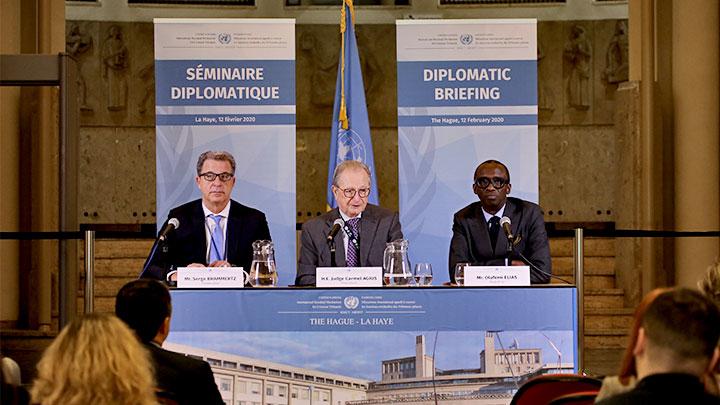Mechanism’s Principals hold Diplomatic Briefing in The Hague

The Principals of the International Residual Mechanism for Criminal Tribunals (Mechanism) today welcomed some 90 members of the diplomatic corps accredited to the Kingdom of the Netherlands and international organisations to a briefing held at the Mechanism’s premises in The Hague.
During the briefing, President Carmel Agius, Prosecutor Serge Brammertz and Registrar Olufemi Elias provided an overview of the Mechanism’s current activities and challenges, as well as the anticipated workload in the coming year. They thanked State representatives for their invaluable support to the Mechanism and highlighted the need for continued cooperation and assistance, particularly in relation to: locating and arresting the eight remaining fugitives indicted by the International Criminal Tribunal for Rwanda (ICTR); enforcing the sentences of persons convicted by the ICTR, the International Criminal Tribunal for Yugoslavia (ICTY) or the Mechanism; and finding a permanent solution for the nine persons who were acquitted or released by the ICTR and who currently reside in a safe house in Arusha.
President Agius briefed the diplomatic corps on the Mechanism’s current judicial caseload, emphasising the importance of 2020 due to the expected completion of most pending proceedings, while noting that the Mechanism’s continuous residual functions will nevertheless extend into the foreseeable future. He also provided an update regarding the main priorities of his Presidency, and outlined the main challenges currently facing the Mechanism that require further State support.
Prosecutor Brammertz provided an overview of the key activities of his Office. He emphasised the need for continued support in the tracking of the remaining ICTR fugitives. Moreover, he underscored the importance of ensuring continued support for justice for victims and identification of missing persons. In this regard, he noted the substantial increase in the requests for assistance by national jurisdictions, especially from the countries in the former Yugoslavia. The Prosecutor mentioned a number of initiatives undertaken by his Office to enhance its assistance to national authorities.
Registrar Elias outlined a number of core priorities for the Mechanism’s Registry in the upcoming period. These include: facilitating the efficient completion of the ongoing cases; providing protection and support to ICTR, ICTY and Mechanism victims and witnesses; assisting national judicial authorities; and further improving the accessibility of the public judicial records and archives.